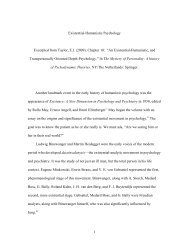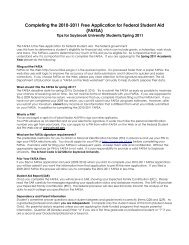Appendix F - Saybrook University
Appendix F - Saybrook University
Appendix F - Saybrook University
Create successful ePaper yourself
Turn your PDF publications into a flip-book with our unique Google optimized e-Paper software.
investigating both the pioneering explorations in the field and<br />
contemporary research and theories. At the same time it allows<br />
for the investigation of students' individual areas of interest,<br />
whether they be altered states of consciousness, theoretical models<br />
of consciousness, or data from the neurosciences. .3.0 credits.<br />
PSY 3030<br />
Cognitive Psychology<br />
Major theories and concepts in the psychology of cognition and<br />
learning are studied in this course. Readings encompass educational<br />
psychology, information processing, cognitive development,<br />
cognition and emotion, language, gender differences, and<br />
cognitive psychology as ideology. 3.0 credits.<br />
PSY 3090<br />
PSY 2505<br />
Contemporary Neuroscience–Psychology and the Brain<br />
Contemporary neuroscience is an increasingly important, indeed<br />
essential, component to the understanding of human nature in<br />
virtually every academic or applied context. This is reflected by<br />
the fact that it is sampled significantly on the vast majority of<br />
advanced placement and certification examinations. This course<br />
leads the student to a basic understanding of the nervous system<br />
and particularly the brain. It begins with the basic facts and principles<br />
of nerve cells and the functional organization of the nervous<br />
system, and proceeds to examine the role of the nervous system<br />
in such functions as emotion, cognition, and other aspects of<br />
consciousness. 3.0 credits.<br />
Psychopharmacology<br />
This course is “cross-listed” as MFT 2505 and PSY 2505.<br />
Students have the choice of selecting the discipline prefix, This<br />
course is designed to give license bound students an orientation<br />
to the role and challenges of chemotherapy in clinical practice.<br />
This course meets the requirements of the California Board of<br />
Behavioral Sciences for the MFT license and is a required course<br />
for all MFT students. Other students are welcome to take this<br />
course, but each student must determine if this course meets the<br />
requirements for duration and content required by their state's<br />
licensing board. There are variations, and this course does not<br />
meet all state's requirements. 3.0 credits.<br />
272
















